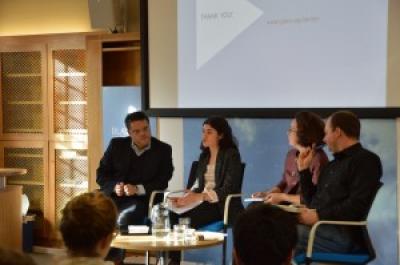8 Feb 2013 Seminar: Delivering Development
Delivering Development: Can Business Succeed Where Traditional Donors Fail?
A joint GEG/BSG seminar on 8 February 2013 asked: in delivering development, can business succeed where traditional donors fail?
Business and Development 037Corporate actors have a growing and influential presence in international development. Social entrepreneurs, venture philanthropy, and corporate social responsibility initiatives provide alternative channels to official development assistance (ODA), relying on the methods of business to solve a wide array of global economic and social problems.
This “quiet” corporate revolution in development has been celebrated for generating greater efficiency, cutting-edge innovation, enhanced accountability and transparency, better targeting of recipients and more sustainable outcomes. There is considerable optimism that corporate engagement and market-based models in aid can rejuvenate flagging public support for ODA. Who are these private actors, and will their methods deliver better development outcomes? Or, as detractors claim, will an over-reliance on corporates come at the expense of real social and political transformation and generate vested interests in the “poverty business”?
Panelists
Henry Gonzalez, Head of Research at responsAbility Investments, began by arguing the three sectors (private, public and civil society) work best together. He focused on impact investing and microfinance, which are relatively well-developed fields dominated by actors with the intention to generate measurable social and environmental impact alongside a financial return.
Rita Perakis discussed her work coordinating the launch of Development Impact Bonds at the Centre for Global Development. Development impact bonds provide upfront funding for development programs. Private investors provide funds, and they are remunerated by donors or host-country governments – with a return – if evidence shows the programs achieved pre-agreed outcomes. This shifts the focus of development inputs to outcomes instead of inputs, processes, and price.
Alexander Woolcombe, Programme Officer in charge of UK and EU Government Relations at the Gates Foundation, began by distinguishing philanthropy from private sector actors. He pointed out there space for both. For instance, since the private sector does not often put up R&D funding for development issues, the Gates Foundation can step in and fund research into vaccines and neglected diseases. He also discussed the changes brought by results oriented approaches, the increased use of science and technology, and novel partnerships between different types of actors.

